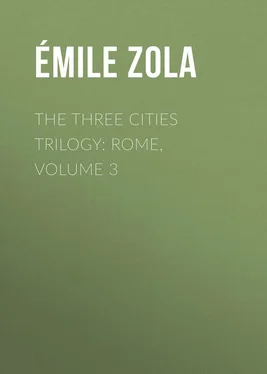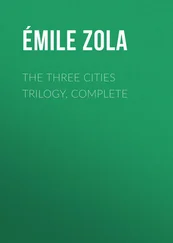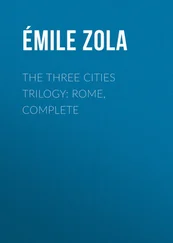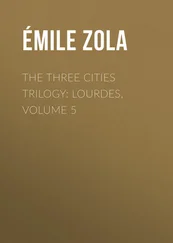Émile Zola - The Three Cities Trilogy - Rome, Volume 3
Здесь есть возможность читать онлайн «Émile Zola - The Three Cities Trilogy - Rome, Volume 3» — ознакомительный отрывок электронной книги совершенно бесплатно, а после прочтения отрывка купить полную версию. В некоторых случаях можно слушать аудио, скачать через торрент в формате fb2 и присутствует краткое содержание. Жанр: literature_19, foreign_antique, foreign_prose, на английском языке. Описание произведения, (предисловие) а так же отзывы посетителей доступны на портале библиотеки ЛибКат.
- Название:The Three Cities Trilogy: Rome, Volume 3
- Автор:
- Жанр:
- Год:неизвестен
- ISBN:нет данных
- Рейтинг книги:3 / 5. Голосов: 1
-
Избранное:Добавить в избранное
- Отзывы:
-
Ваша оценка:
- 60
- 1
- 2
- 3
- 4
- 5
The Three Cities Trilogy: Rome, Volume 3: краткое содержание, описание и аннотация
Предлагаем к чтению аннотацию, описание, краткое содержание или предисловие (зависит от того, что написал сам автор книги «The Three Cities Trilogy: Rome, Volume 3»). Если вы не нашли необходимую информацию о книге — напишите в комментариях, мы постараемся отыскать её.
The Three Cities Trilogy: Rome, Volume 3 — читать онлайн ознакомительный отрывок
Ниже представлен текст книги, разбитый по страницам. Система сохранения места последней прочитанной страницы, позволяет с удобством читать онлайн бесплатно книгу «The Three Cities Trilogy: Rome, Volume 3», без необходимости каждый раз заново искать на чём Вы остановились. Поставьте закладку, и сможете в любой момент перейти на страницу, на которой закончили чтение.
Интервал:
Закладка:
It was the /cortege/ of the olden solemnities, the cross and sword, the Swiss Guard in full uniform, the valets in scarlet simars, the Knights of the Cape and the Sword in Renascence costumes, the Canons in rochets of lace, the superiors of the religious communities, the apostolic prothonotaries, the archbishops, and bishops, all the pontifical prelates in violet silk, the cardinals, each wearing the /cappa magna/ and draped in purple, walking solemnly two by two with long intervals between each pair. Finally, around his Holiness were grouped the officers of the military household, the chamber prelates, Monsignor the Majordomo, Monsignor the Grand Chamberlain, and all the other high dignitaries of the Vatican, with the Roman prince assistant of the throne, the traditional, symbolical defender of the Church. And on the /sedia gestatoria/, screened by the /flabelli/ with their lofty triumphal fans of feathers and carried on high by the bearers in red tunics broidered with silk, sat the Pope, clad in the sacred vestments which he had assumed in the Chapel of the Blessed Sacrament, the amict, the alb, the stole, and the white chasuble and white mitre enriched with gold, two gifts of extraordinary sumptuousness that had come from France. And, as his Holiness drew near, all hands were raised and clapped yet more loudly amidst the waves of living sunlight which streamed from the lofty windows.
Then a new and different impression of Leo XIII came to Pierre. The Pope, as he now beheld him, was no longer the familiar, tired, inquisitive old man, leaning on the arm of a talkative prelate as he strolled through the loveliest gardens in the world. He no longer recalled the Holy Father, in red cape and papal cap, giving a paternal welcome to a pilgrimage which brought him a fortune. He was here the Sovereign Pontiff, the all-powerful Master whom Christendom adored. His slim waxen form seemed to have stiffened within his white vestments, heavy with golden broidery, as in a reliquary of precious metal; and he retained a rigid, haughty, hieratic attitude, like that of some idol, gilded, withered for centuries past by the smoke of sacrifices. Amidst the mournful stiffness of his face only his eyes lived – eyes like black sparkling diamonds gazing afar, beyond earth, into the infinite. He gave not a glance to the crowd, he lowered his eyes neither to right nor to left, but remained soaring in the heavens, ignoring all that took place at his feet.
And as that seemingly embalmed idol, deaf and blind, in spite of the brilliancy of his eyes, was carried through the frantic multitude which it appeared neither to hear nor to see, it assumed fearsome majesty, disquieting grandeur, all the rigidity of dogma, all the immobility of tradition exhumed with its /fascioe/ which alone kept it erect. Still Pierre fancied he could detect that the Pope was ill and weary, suffering from the attack of fever which Nani had spoken of when glorifying the courage of that old man of eighty-four, whom strength of soul alone now kept alive.
The service began. Alighting from the /sedia gestatoria/ before the altar of the Confession, his Holiness slowly celebrated a low mass, assisted by four prelates and the pro-prefect of the ceremonies. When the time came for washing his fingers, Monsignor the Majordomo and Monsignor the Grand Chamberlain, accompanied by two cardinals, poured the water on his august hands; and shortly before the elevation of the host all the prelates of the pontifical court, each holding a lighted taper, came and knelt around the altar. There was a solemn moment, the forty thousand believers there assembled shuddered as if they could feel the terrible yet delicious blast of the invisible sweeping over them when during the elevation the silver clarions sounded the famous chorus of angels which invariably makes some women swoon. Almost immediately an aerial chant descended from the cupola, from a lofty gallery where one hundred and twenty choristers were concealed, and the enraptured multitude marvelled as though the angels had indeed responded to the clarion call. The voices descended, taking their flight under the vaulted ceilings with the airy sweetness of celestial harps; then in suave harmony they died away, reascended to the heavens as with a faint flapping of wings. And, after the mass, his Holiness, still standing at the altar, in person started the /Te Deum/, which the singers of the Sixtine Chapel and the other choristers took up, each party chanting a verse alternately. But soon the whole congregation joined them, forty thousand voices were raised, and a hymn of joy and glory spread through the vast nave with incomparable splendour of effect. And then the scene became one of extraordinary magnificence: there was Bernini's triumphal, flowery, gilded /baldacchino/, surrounded by the whole pontifical court with the lighted tapers showing like starry constellations, there was the Sovereign Pontiff in the centre, radiant like a planet in his gold-broidered chasuble, there were the benches crowded with cardinals in purple and archbishops and bishops in violet silk, there were the tribunes glittering with official finery, the gold lace of the diplomatists, the variegated uniforms of foreign officers, and then there was the throng flowing and eddying on all sides, rolling billows after billows of heads from the most distant depths of the Basilica. And the hugeness of the temple increased one's amazement; and even the glorious hymn which the multitude repeated became colossal, ascended like a tempest blast amidst the great marble tombs, the superhuman statues and gigantic pillars, till it reached the vast vaulted heavens of stone, and penetrated into the firmament of the cupola where the Infinite seemed to open resplendent with the gold-work of the mosaics.
A long murmur of voices followed the /Te Deum/, whilst Leo XIII, after donning the tiara in lieu of the mitre, and exchanging the chasuble for the pontifical cope, went to occupy his throne on the platform at the entry of the left transept. He thence dominated the whole assembly, through which a quiver sped when after the prayers of the ritual, he once more rose erect. Beneath the symbolic, triple crown, in the golden sheathing of his cope, he seemed to have grown taller. Amidst sudden and profound silence, which only feverish heart-beats interrupted, he raised his arm with a very noble gesture and pronounced the papal benediction in a slow, loud, full voice, which seemed, as it were, the very voice of the Deity, so greatly did its power astonish one, coming from such waxen lips, from such a bloodless, lifeless frame. And the effect was prodigious: as soon as the /cortege/ reformed to return whence it had come, applause again burst forth, a frenzy of enthusiasm which the clapping of hands could no longer content. Acclamations resounded and gradually gained upon the whole multitude. They began among a group of ardent partisans stationed near the statue of St. Peter: /"Evviva il Papa-Re! evviva il Papa-Re/! Long live the Pope-King!" as the /cortege/ went by the shout rushed along like leaping fire, inflaming heart after heart, and at last springing from every mouth in a thunderous protest against the theft of the states of the Church. All the faith, all the love of those believers, overexcited by the regal spectacle they had just beheld, returned once more to the dream, to the rageful desire that the Pope should be both King and Pontiff, master of men's bodies as he was of their souls – in one word, the absolute sovereign of the earth. Therein lay the only truth, the only happiness, the only salvation! Let all be given to him, both mankind and the world! "/Evviva il Papa-Re! evviva il Papa-Re/! Long live the Pope-King!"
Ah! that cry, that cry of war which had caused so many errors and so much bloodshed, that cry of self-abandonment and blindness which, realised, would have brought back the old ages of suffering, it shocked Pierre, and impelled him in all haste to quit the tribune where he was in order that he might escape the contagion of idolatry. And while the /cortege/ still went its way and the deafening clamour of the crowd continued, he for a moment followed the left aisle amidst the general scramble. This, however, made him despair of reaching the street, and anxious to escape the crush of the general departure, it occurred to him to profit by a door which he saw open and which led him into a vestibule, whence ascended the steps conducting to the dome. A sacristan standing in the doorway, both bewildered and delighted at the demonstration, looked at him for a moment, hesitating whether he should stop him or not. However, the sight of the young priest's cassock combined with his own emotion rendered the man tolerant. Pierre was allowed to pass, and at once began to climb the staircase as rapidly as he could, in order that he might flee farther and farther away, ascend higher and yet higher into peace and silence.
Читать дальшеИнтервал:
Закладка:
Похожие книги на «The Three Cities Trilogy: Rome, Volume 3»
Представляем Вашему вниманию похожие книги на «The Three Cities Trilogy: Rome, Volume 3» списком для выбора. Мы отобрали схожую по названию и смыслу литературу в надежде предоставить читателям больше вариантов отыскать новые, интересные, ещё непрочитанные произведения.
Обсуждение, отзывы о книге «The Three Cities Trilogy: Rome, Volume 3» и просто собственные мнения читателей. Оставьте ваши комментарии, напишите, что Вы думаете о произведении, его смысле или главных героях. Укажите что конкретно понравилось, а что нет, и почему Вы так считаете.












